
Mie Prefecture is a prefecture of Japan, which is part of the Kansai region on the main Honshu island. The capital is the city of Tsu.
Hiroo Yamagata is a Japanese author, critic, economist, and translator. He translated some important works in computer technology such as "The Cathedral and the Bazaar" by Eric S. Raymond, "Code and Other Laws of Cyberspace" by Lawrence Lessig into Japanese. He is also the founder and chairman of Project Sugita Genpaku, which is a volunteer effort to translate free content texts into Japanese.

Hirō "Hiroo" Onoda was an Imperial Japanese Army intelligence officer who fought in World War II and was a Japanese holdout who did not surrender at war's end in August 1945. After the war ended Onoda spent 29 years holding out in the Philippines until his former commander traveled from Japan to formally relieve him from duty by order of the Emperor in 1974. He held the rank of second lieutenant in the Imperial Japanese Army. He was the penultimate Japanese soldier to surrender, with Teruo Nakamura surrendering later in 1974.

Tokachi is a subprefecture of Hokkaido Prefecture, Japan corresponding to the old province of Tokachi. As of 2004, its estimated population is 360,802 and its area is 10,830.99 km².
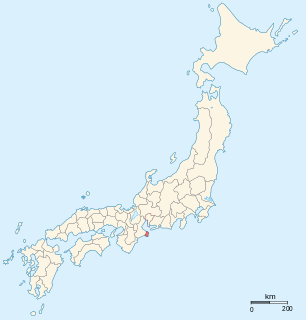
Shima Province was a province of Japan which consisted of a peninsula in the southeastern part of modern Mie Prefecture. Its abbreviated name was Shishū (志州). Shima bordered on Ise Province to the west, and on Ise Bay on the north, east and south.
Hiroo Kanamori is a Japanese seismologist who has made fundamental contributions to understanding the physics of earthquakes and the tectonic processes that cause them.

Shimokawa is a town located in Kamikawa Subprefecture, Hokkaido, Japan.

Hiroo is a town located in Tokachi Subprefecture, Hokkaido, Japan.
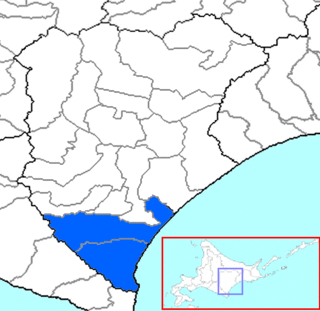
Hiroo is a district located in Tokachi Subprefecture, Hokkaido, Japan.
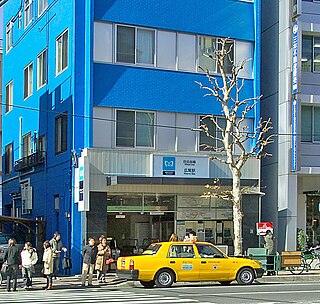
Hiroo Station is a subway station on the Tokyo Metro Hibiya Line in Minato, Tokyo operated by the Tokyo subway operator Tokyo Metro. The station is named after the adjacent Hiroo neighborhood in Shibuya ward, though the station is entirely located in Minami-Azabu.

Shima is a city in Mie Prefecture, Japan.
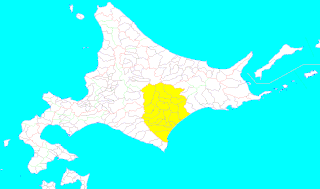
Tokachi Province was a short-lived province in Hokkaidō. It corresponded to modern-day Tokachi Subprefecture.

Kachō Kōsaku Shima is the first in a number of Japanese manga series, by Kenshi Hirokane, about a fictional salaryman named Kōsaku Shima. The series ran from 1983–1992 under this title, winning the 1991 Kodansha Manga Award in the General category. As of 2013, the series has sold over 40 million copies in Japan.
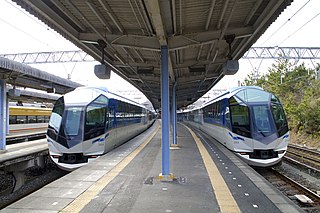
The Shima Line is a railway line in Mie Prefecture, Japan, operated by private railway operator Kintetsu Railway, connecting Toba Station in Toba with Kashikojima Station in Shima.

Hiroo (広尾) is a district of Shibuya, Tokyo, Japan. Abutting on opulent Ebisu, Minami-Azabu, Nishi-Azabu and Minami-Aoyama, Hiroo is one of the most prominent upmarket residential and shopping neighborhoods in Tokyo.
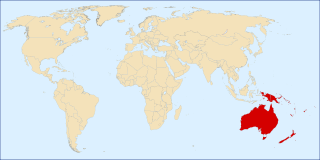
The following outline is provided as an overview and topical guide to Oceania.
Shima is a 2007 film from Uzbekistan.
Hiroo is a masculine Japanese given name. Notable people with the name include:
Shima is a Japanese surname. Notable people with the surname include:

The Obihiro-Hiroo Expressway is an incomplete two-lane national expressway in Tokachi Subprefecture, Hokkaido. It is owned and operated primarily by the Ministry of Land, Infrastructure, Transport and Tourism (MLIT), but has a short section maintained and tolled by the East Nippon Expressway Company at its northern terminus with the Dōtō Expressway. The route is signed as an auxiliary route of National Route 236 as well E60 under MLIT's "2016 Proposal for Realization of Expressway Numbering."














